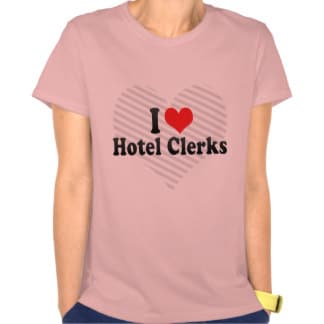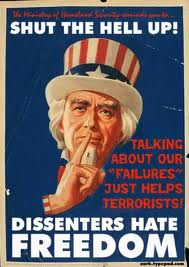At the request of an organizer from the union, UNITE/HERE (see comment on last post), I am posting this interesting video. Hotel workers are notoriously overworked and underpaid. Karen and I have talked to many motel workers in our years of travel, and I can say from experience that this is the case. We both worked at the Lake Hotel in Yellowstone National Park, Karen as a restaurant host and I as a desk clerk. This was a most illuminating experience, described in Chapter Two of Cheap Motels and a Hot Plate. I applaud the hardworking organizers and wish them great success. Look at the video and then read an excerpt from the chapter on Yellowstone. Be sure to support the union efforts of hotel workers. Spread the word, send money, join picket lines, whatever you can.
Analyzing work is one thing; doing it is another. We have all dealt with clerks; there are millions of them in the United States. But most of us don’t know much about what it means to be one. Here is what I learned.
The work was demanding. It wasn’t factory labor, but it was tiring and stressful. I was on my feet six to eight hours at a stretch, and this took its toll on my legs. The Sunday before Memorial Day, I worked eight hours without a break, neither to rest nor to eat. Guests arrived nonstop, asked a million questions, and had complicated financial arrangements to be solved. Rooms weren’t ready even into the evening (there was a shortage of housekeepers); cabin roofs were leaking; people were assigned to rooms without enough beds; and we kept putting guests into already occupied rooms. How this happened I cannot say, but the computer screen would show a room vacant and cleaned; we would assign someone to it; and a while later people would come back to the desk screaming that they had walked in on people in bed. A desk clerk’s worst nightmare. So I had a steady stream of complaining guests, and these were holding up people still trying to get accommodations and others wanting to ask questions about tours to take and things to see in the park. And all the while the phone rang, probably five hundred times during my shift alone. The hotel’s manager had to deal with so many complaints that he said it was the worst night in his memory. At least he felt so bad for us that he got us some pizza later in the evening to make up for our missed supper. The only good thing about the night was that it was not again equaled. So the worst was over.
This is what I did each day. I checked people in, usually routine but not always. People sometimes wanted to upgrade or split their bills in complex ways or had special requests. I kept track of availability, not just here but in each of the eight hotels in the park. We were expected to make same-day or next-day reservations for any of them. I answered phones, mostly to connect callers to guests (it wasn’t possible to dial a room directly from the outside), but often enough to answer some annoying question—one person from the United States asked if it was safe to drink the water (while working the host stand in the restaurant, Karen was asked to give a caller detailed driving directions from Los Angeles). I answered a never-ending barrage of questions. Where is the bathroom? What is the weather report? Can I change rooms? Where is the ice machine? How do I make a dinner reservation? What is there to do? When does Old Faithful erupt? How long does it take to get there? Where is the Elephant Back trail? Where is a good spot to go fishing? How do you get to Grand Teton National Park? What’s the best way to get to Cody, Wyoming? Do you have the number of a rental car company in Jackson? Who designed the flower arrangement on our desk? There was nothing we were not expected to know or be able to find out, and after a time I began to take great pride in answering the most arcane or foolish question.
I ticketed and booked activities, of which there were many: bus tours, boat tours, horse rides at several park locations, photo safaris, chuck wagon cookouts, and wildlife excursions. It was tedious and time-consuming to check in a family and then book or ticket their activities, especially if they began to ask questions about them and there was a long line of guests. I kept housekeeping and maintenance aware of any problems in the rooms and other parts of the hotel. I checked people out, which again was usually routine but not always. Most people didn’t go over their itemized bills but some did, and if they had questions about particular charges, I had to find out about them, which could involve a laborious search through the dining receipts. Once a waiter, unhappy with the size of a tip, altered a receipt, changing a zero to an eight. It took us a long time to unravel this bill, although it was exciting to catch the crook. I kept careful account of all cash transactions. These had to be posted to the right accounts, or else our book wouldn’t balance at the end of the shift. When we were done with our shifts we had to file preliminary reports, see to it that these balanced, and then file a final report, drop our cash into a safe, and put our “bank” away. There were many forms to be aware of and many possibilities for mistakes. One day my cash balance was off by more than $200. Luckily I had written down all my cash transactions, including the name of the guests giving me cash. I had forgotten to post a cash payment and so it showed up as a credit card transaction.
Eventually a job becomes routine, and desk clerking was no exception. However, a crisis can always undermine routine and then you learn how little you know. One day in June it began to snow, and by late the next morning there was a foot on the ground. The entire park was closed; no one could leave and no one could enter. At the time the hotel was completely booked, all three hundred or so rooms and cabins. I began work at 6:30 that morning, and I worked nonstop until about 12:30 that afternoon. The place was bedlam, with guests crowding around the front desk wanting to know what they should do. Would they be able to get out? Would they be able to catch planes? Could they stay another night? Was the snow going to continue and, if so, for how long? What was the temperature? How much snow had fallen, were activities cancelled, and on and on and on. As we tried to deal with all of this, the power went out every few minutes and the phone rang off the hook. Had I found someone’s cell phone? Why didn’t our tub drain? Why hadn’t I made a wake-up call exactly when the guest had requested?
In the midst of the chaos, I took a phone call from a man in England. Had a fax come through for a guest, the caller’s father? We then proceeded to have a protracted conversation about this fax, which he said was urgent. It turned out that he had sent it to the wrong fax number. I gave him the correct number, and he said he would call me back later to be sure we had received it. I then got back to the nightmare at the front desk. About thirty minutes later, the phone rang and a fellow clerk said that there was a long-distance call for me. I thought immediately that something was wrong with one of our children, and I picked up the phone fearfully. But it was just Mr. Young asking about the fax. Yes, I said, the fax had come through and I would notify his father, who had not yet checked in, that it was here. Well, he said, could I look at the fax. I got the fax, amidst all of the noise and confusion, went back to the phone, and spoke with Mr. Young (picture a small space with five or six clerks rushing around, very loud noise that made it hard to hear, me with a phone on my right shoulder and a pen in my left hand taking notes). He insisted I verify that five pages had come and that they were all legible. He asked me to look at a particular paragraph. Did I have a highlighter? Would I highlight the sentence beginning with the word “Hereinafter” and ending with the word “yellow.” I did as instructed. He said, “You’ve been soupah [super], Michael.” Later that evening, after the parents of Mr. Young had checked in, my wife received a long-distance call at the restaurant from the son. Were his parents at dinner? How would she know? He had to get in touch with them. Could they be paged? No. Well, he said rudely, she would have to get in touch with them whatever it took. Finally, she said that she would go table to table to find them. She went to each table (remember that this restaurant seated hundreds of people and was as long as a football field) and said, “Are you the Youngs?” Finally, an English couple said that they were. As soon as they learned that their son was calling, they became hysterical. They went to the phone, and, after some business discussion (the fax and the phone calls were about the purchase of a ship), the father told his son not to call him again, because he was on holiday. He ended by saying that he could not take this anymore. Then the mother got on the phone and in a loud and emotional voice told her son to please not call again, because “Daddy is going to have a nervous breakdown.” “Please, please, don’t call again, Daddy can’t take anymore.” All the while the many guests at the host stand must have wondered what the hell was going on. And they never offered a word of thanks to anyone for relaying the message to them nor an apology for such a bizarre conversation.
This story is amusing, and although I was stressed that day, I never lost my composure. The snowstorm was a bonding experience for all the workers, especially the desk clerks who were on the front lines of the bedlam. During all the turmoil, I was thinking about how I would enjoy trading stories with Karen after work. I’d go to the hotel bar and have a couple beers while I waited for her shift to end. However, I soon got a better taste of what work stress can do and no doubt does do to tens of millions of poorly paid and disposable workers.
I became ill in late June—cold, fever, chills—and had to miss a day of work. The day before, I had put in a hard shift behind the front desk, coughing, sneezing, and blowing my nose. It was difficult to care about the problems the guests were encountering. At the end of the shift, I printed out my “preliminary” report showing all my cash transactions. It was important that I balance, that is, that the amount I took in matched what I had in my “bank.” I also had to be sure that all the activities I sold were posted to the correct revenue center. For example, if I sold a boat or horse activity, this went to the “activity” revenue center; but if I sold a bus ride, this went to the “transportation” revenue center. After some problems with preliminary reports, I had learned to keep scrupulous records of all cash and activity transactions. This particular day, I took in several hundred dollars in cash and sold several activities. When I submitted my report, the printer failed to print it out, which meant that I could not check it and get my final report done and go home. This happened frequently, but this time, no one could fix the printer. As the minutes ticked by and I was feeling sicker and sicker and just wanted to go home and crawl under the covers, I got madder and madder. I started muttering. Eventually, I just left. But I had to return later that evening, feeling worse, to do the reports. This took only five (unpaid) minutes, but I was furious. For the first time in my life, I really felt how working people could get so frustrated with their jobs that they could go into a rage, even at some little thing. Under the right circumstances I might have thrown the printer out the window, or become abusive to a pesty guest, or assaulted the supervisor if he had said anything ridiculous.






